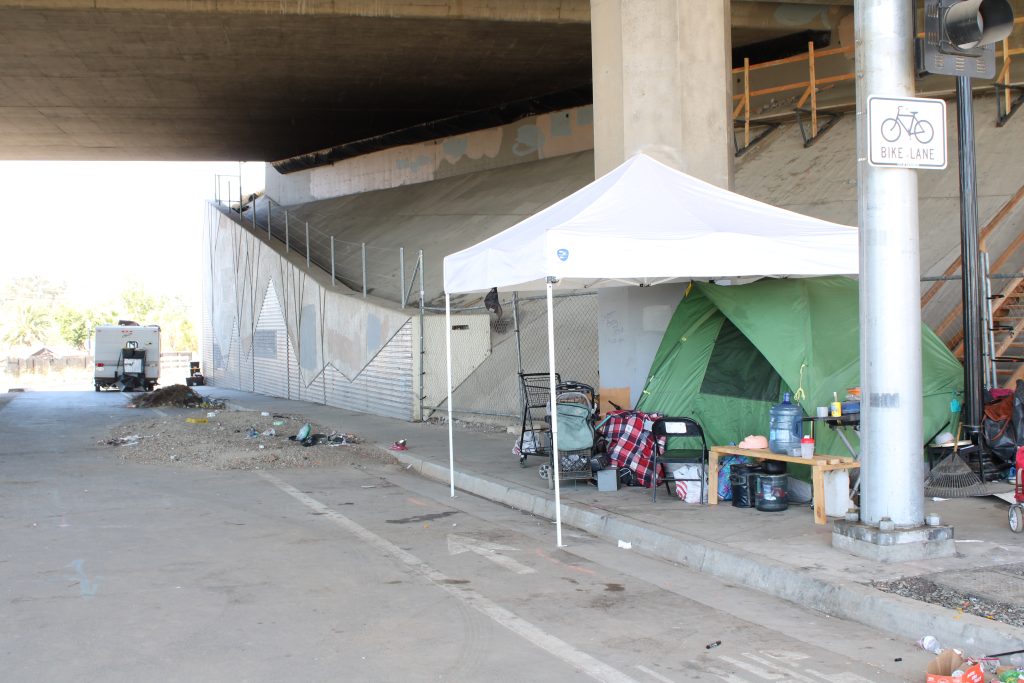By Jacob Peterson
Of the many issues voters are concerned about going into the November runoff election for Sacramento mayor, the topic of how to address homelessness is one of the biggest.
Whether epidemiologist Dr. Flojaune Cofer or Assemblymember Kevin McCarty become mayor following the Nov. 5 election, they will need a game plan to tackle this issue. Likewise, homeless-support organizers in Sacramento have their own hopes regarding how the next mayor addresses the problem, such as Shannon Dominguez-Stevens of Loaves & Fishes, a nonprofit that provides survival services for unhoused people in Sacramento.
“Whoever ends up sitting in that middle seat on the days after the general election,I think one of the big things that we really will continue to push and advocate for is compassionate local policy that is human centered,” said Dominguez-Stevens, who is the director of Maryhouse, an overnight women’s shelter operated by Loaves & Fishes.
“One of the things that we do here as part of our mission is also to amplify the needs and voices of our guests,” Dominguez-Stevens said. “And so that means that we do advocate for policies that would positively impact folks out here.”
Incoming policies
With the election just weeks away, the two mayoral candidates have wasted no time in coming up with ideas of how they would tackle the issue when they take office. McCarty said he believes a key factor in addressing the issue of homelessness is to first address the issue of affordable housing.
McCarty said he correlates the rise in homelessness with the Great Recession and the later loss of redevelopment money from the state budget. McCarty, who started his political career as a Housing and Redevelopment Commissioner for the city, said one of his priorities was bringing back funding sources for affordable housing.
McCarty said the loss of this money has had a big impact on efforts to address the housing crisis and that he wishes to find stable revenue streams to help build more affordable housing.
“I would love to give almost every individual permanent supportive housing,” McCarty said. “But the reality is that if you look at the average cost of those units [they] are $600,000 or more.”
Cofer said affordable housing is also an important part of her plan. She wants to make sure that not only does the cost of living not drive people out, but that there are affordable options for people to buy a home, she said.
“The majority of our housing stock are single family homes and those prices are near half $1 million,” Cofer said. “We also need to be thinking about what are some of the
ways that we can lower the price of housing and make some of those housing units affordable.”
Cofer said she’s approaching the issue from a public health perspective as well, not only looking at bringing people out of homelessness but also taking measures to prevent more from falling into it.
Where the two candidates diverge is on the issue of sweeps. Cofer said she is against the city having a pro-sweep policy.
“Let’s call it what it is,” Cofer said. “It’s ‘dealing with’ as opposed to ‘serving’ and it is cruel and I think we can do better than that.”
McCarty said he supports the city implementing the law and not allowing people to camp in parks and in front of businesses, but that there needs to be more follow through with pointing people toward resources.
“I do support enforcing the law, enforcing the no camping ordinance,” McCarty said. “At the same time, we need to work compassionately and point where people can go.”

Concerns over sweeps
Dominguez-Stevens is concerned over the incoming mayor’s policy toward homeless sweeps. She said various organizers have pushed back on the use of the practice.
“Sweeps are harmful and they perpetuate a lot of the violence that occurs out here,” Dominguez-Stevens said. “We will continue to push to stop the sweeps and instead spend that time and energy on creating more permanent supportive housing, more accessible shelter.”
Dominguez-Stevens said she anticipates much of her and other organizers’ time will be spent making sure the next mayor understands the full scope of the issue.
“It really is rooted in policy decisions,” Dominguez-Stevens said, “and they have the opportunity to change the way things are done.”
The use of sweeps has become an ever more prominent debate, with the Supreme Court decision on City of Grants Pass v. Johnson adding further fuel to the divisive topic. Decided on June 28, the decision allows cities to levy civil and criminal penalties for camping on public land even when shelter space is not available.
Lisa Bates, CEO of nonprofit Sacramento Steps Forward, said that in light of the decision there needs to be more discussion across the region about how to interpret the decision with a focus on finding solutions to resolve homelessness.
“Let’s not be distracted that somehow the Grants Pass decision is a solution,” Bates said. “It’s not necessarily what causes us to be able to resolve homelessness.”
Sacramento Steps Forward primarily works on assessing and evaluating the systemic responses to homelessness, according to Bates. She said the organization also helps set standards for community intervention and collects data to provide to the public.
A prime example of this data is the biennial Point-in-Time Count, which records an estimate on how many homeless people there are, amongst other data points. According to the 2024 PIT Count released in June, there are a total of 6,615 people experiencing homelessness in the Sacramento area.
Bates said the various agencies working to resolve homelessness also need to work toward better coordinating with one another.
“To address or solve homelessness it really requires a system response,” she said. “No one entity, no one person, no one program is going, by themselves, to be effective in addressing the larger problem.”
Bates said she believes progress has been made in better uniting the efforts towards solving homelessness, but it needs to be sustained and reinforced.
“I think that’s going to be really key for anybody coming in, is to step back and look at what’s the infrastructure that is emerging or in place and how do we build upon that or improve upon it,” Bates said.
Niki Jones, executive director for the Sacramento Regional Coalition to End Homeless, also echoed concerns over sweeps.
“We need a mayor who’s not going to rely on the status quo of forced displacement policies,” Jones said. “This has not only been ineffective at solving homelessness, but has caused immeasurable harm in people’s lives every day.”
Jones said the incoming mayor should make an effort to give the poorer residents of Sacramento a voice when it comes to policy decisions. She said this was an important step in slowing the inflow of homelessness.
“There has to be some policy intervention that is going to stop that flow into homelessness,” Jones said. “Not only do we need to stop the flow in, but we need to widen access to the housing that is available and exists.”
The runoff election for the mayor of Sacramento will be held on Nov. 5. For more information, visit the Sacramento County voter registration and elections webpage.
This story is part of the Solving Sacramento journalism collaborative. Solving Sacramento is supported by funding from the James Irvine Foundation and the James B. McClatchy Foundation. Our partners include California Groundbreakers, Capital Public Radio, Outword, Russian America Media, Sacramento Business Journal, Sacramento News & Review, Sacramento Observer and Univision 19. Sign up for our monthly newsletter.


Be the first to comment on "Organizations supporting Sacramento’s unhoused weigh in on mayoral expectations"